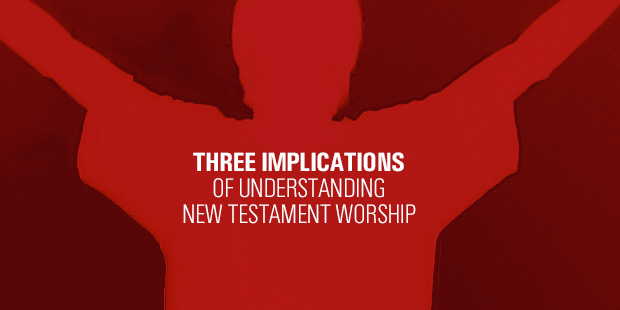
The Disciplemaking Worldview: What is the Gospel?
Auxano Navigator David Putman is committed to catalyzing gospel-centered, disciple-making movements. He lives out his mission by helping others go further, faster, and longer than they ever imagined. David’s writings have been the primary foundation of this SUMS Remix.
According to David, disciple making at its core is about worldview transformation. A person’s worldview is the way they see and understand the world. Our worldview is based on our core beliefs. These non-negotiable beliefs determine our behavior. In other words, what we believe determines our behavior.
As a disciple of Christ we might frame it this way, “What we believe about the gospel determines how we follow Jesus.”
David uses a simple tool he created called the “Gospel Lens” to illustrate this. This tool is based on three questions that he believes have a very unique and specific relationship to one another.
It is essential that we begin with the gospel, move to disciple, and finally to the church in the order we ask and answer these questions. In other words, the gospel informs our understanding of disciples, and our understanding of disciples informs our understanding of the church.
What is the Gospel?
THE QUICK SUMMARY – Gospel: Recovering the Power that Made Christianity Revolutionary by J.D. Greear
Could the gospel be lost in evangelical churches? In this book, J.D. Greear shows how moralism and legalism have often eclipsed the gospel, even in conservative churches. Gospel cuts through the superficiality of religion and reacquaints you with the revolutionary truth of God’s gracious acceptance of us in Christ. The gospel is the power of God, and the only true source of joy, freedom, radical generosity, and audacious faith. The gospel produces in us what religion never could: a heart that desires God.
The book’s core is a “gospel prayer” by which you can saturate yourself in the gospel daily. Dwelling on the gospel will release in you new depths of passion for God and take you to new heights of obedience to Him. Gospel gives you an applicable, exciting vision of how God will use you to bring His healing to the world.
A Simple Solution
The essence of gospel is good news. It’s an announcement that God has done something for us that we could not do for ourselves. All other religious systems offer us good advice. The gospel offers us the Good News.
Jesus begins His ministry with an announcement, “The time has come the kingdom of God is near. Repent and believe the good news” (Mark 1:15, NIV)! In essence He was saying the King has come. Everything has changed. What God began in Genesis, He completes in Jesus. This announcement is good news because in Jesus, God announces that we are redeemed, we are being renewed, and He is restoring all things through us.
It is one thing to understand the gospel but it is quite another to experience the gospel in such a way that it fundamentally changes us and becomes the sources of our identity and security. It is one thing to grasp the essence of the gospel but quite another to think out its implications for all of life. We all struggle to explore the mysteries of the gospel on a regular basis and to allow its message to influence our thinking.
The gospel is not just supposed to be our ticket into heaven; it is to be an entirely new basis for how we relate to God, ourselves, and others. It is to be the source from which everything else flows.
In the last message Jesus gave to His disciples, He told them that the way to fruitfulness and joy – the “secret” to the Christian life – was to abide in Him. They wouldn’t produce “abundant fruit” by reading books, intensifying their self-discipline, memorizing Scripture, or getting in accountability groups. Those things all have their place, but real fruit comes only from one place: abiding in Jesus.
The point is that to produce real love in your heart for God takes something beyond spiritual gifts, greater doctrinal knowledge, audacious faith, and even radical obedience. Something entirely different. Radically different.
That’s where the gospel comes in. The gospel, and the gospel alone, has the power to produce love for God in the heart. Paul calls the gospel “God’s power for salvation” (Romans 1:16). Religion can tell you what to do – namely, to “love God with all your heart, soul, and mind” and “to love your neighbor as yourself”; but the gospel alone gives you the power to do it.
The gospel, however, is not just the diving board off of which we jump into the pool of Christianity; it is the pool itself. It is not only the way we begin in Christ; it is the way we grow in Christ. As Tim Keller says, the gospel is not just the ABCs of Christianity, it is the A-Z; it is not the first step in a stairway of truths, it is more like the hub of God’s wheel of truth. All other Christian virtues flow out of it.
Always “begin again” with the gospel. Abide in it; swim in it; make your home in it. See more and more of your life through it. Be absolutely convinced at every moment of every day of the goodness of God in your life. That’s the only way you’ll ever really grow.
J.D. Greear, Gospel: Recovering the Power that Made Christianity Revolutionary
A NEXT STEP
Author J.D. Greer has developed a tool he calls “The Gospel Prayer” to help saturate himself with the truth of the gospel.
Set aside a quiet time to read and reflect on the following prayer, and make it a part of your daily devotional life.
There’s nothing magical about this prayer. It’s not an incantation to get God to do good things for you. Incidentally, it’s also not my attempt to replace the Lord’s Prayer. This prayer is simply a tool to help you train your mind in the patterns of the gospel. The point is not the prayer; the point is thinking in line with the gospel.
The Gospel Prayer has four parts. The first two parts lead us inward, helping us to renew our minds in God’s acceptance of us and the value of that acceptance to us:
- “In Christ, there is nothing I can do that would make You love me more, and nothing I have done that makes You love me less.”
- “Your presence and approval are all I need for everlasting joy.”
Part 3 of the prayer has us consider what responding to the grace of the gospel looks like. Understanding God’s generosity toward us should lead us to radical generosity toward others.
- “As You have been to me, so I will be to others.”
Part 4 of the prayer helps us see our world through the lens of the gospel and moves us to audacious faith. If the cross really does reveal God’s compassion for sinners and the resurrection reveals His power to save them, then our prayers on their behalf should be audacious and bold:
- “As I pray, I’ll measure Your compassion by the cross and Your power by the resurrection.”
Excerpt taken from SUMS Remix 108-1, released December 2018.
This is part of a weekly series posting excerpts from one of the most innovative content sources in the church world: SUMS Remix book excerpts for church leaders.
SUMS Remix takes a practical problem in the church and looks at it with three solutions; each solution is taken from a different book. Additionally, a practical action step is included with each solution.
As a church leader you get to scan relevant books based on practical tools and solutions to real ministry problems, not just by the cover of the book. Each post will have the edition number which shows the year and what number it is in the overall sequence. (SUMS Remix provides 26 issues per year, delivered every other week to your inbox).
>> Subscribe to SUMS Remix <<




































